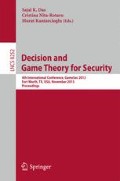Abstract
Crowdsourcing has emerged as a useful learning paradigm which allows us to instantly recruit workers on the web to solve large scale problems, such as quick annotation of image, web page, or document databases. Automated inference engines that fuse the answers or opinions from the crowd to make critical decisions are susceptible to unreliable, low-skilled and malicious workers who tend to mislead the system towards inaccurate inferences. We present a probabilistic generative framework to model worker responses for multicategory crowdsourcing tasks based on two novel paradigms. First, we decompose worker reliability into skill level and intention. Second, we introduce a stochastic model for answer generation that plausibly captures the interplay between worker skills, intentions, and task difficulties. This framework allows us to model and estimate a broad range of worker “types”. A generalized Expectation Maximization algorithm is presented to jointly estimate the unknown ground truth answers along with worker and task parameters. As supported experimentally, the proposed scheme de-emphasizes answers from low skilled workers and leverages malicious workers to, in fact, improve crowd aggregation. Moreover, our approach is especially advantageous when there is an (a priori unknown) majority of low-skilled and/or malicious workers in the crowd.
Access this chapter
Tax calculation will be finalised at checkout
Purchases are for personal use only
Preview
Unable to display preview. Download preview PDF.
References
Amazon Mechanical Turk, http://www.mturk.com
Flower, C.: http://crowdflower.com
Funding, C.: http://www.mid-day.com/news/2013/feb/150213-twos-company-tweets-a-crowdfunder.htm
Topcoder, http://topcoder.com
50,000 volunteers join distributed search for Steve Fossett. Wired (September 11, 2007)
Bache, K., Lichman, M.: UCI machine learning repository (2013)
Benbouzid, D., Busa-Fekete, R., Casagrande, N., Collin, F.D., Kégl, B., et al.: Multiboost: a multi-purpose boosting package. Journal of Machine Learning Research 13, 549–553 (2012)
Dawid, A.P., Skene, A.M.: Maximum likelihood estimation of observer error-rates using the EM algorithm. Applied Statistics, 20–28 (1979)
Dempster, A.P., Laird, N.M., Rubin, D.B.: Maximum likelihood from incomplete data via the EM algorithm. Journal of the Royal Statistical Society. Series B (Methodological), 1–38 (1977)
Douceur, J.R.: The sybil attack. In: Druschel, P., Kaashoek, M.F., Rowstron, A. (eds.) IPTPS 2002. LNCS, vol. 2429, pp. 251–260. Springer, Heidelberg (2002)
Feldman, M., Papadimitriou, C., Chuang, J., Stoica, I.: Free-riding and whitewashing in peer-to-peer systems. In: Proceedings of the ACM SIGCOMM Workshop on Practice and Theory of Incentives in Networked Systems, pp. 228–236 (2004)
Graham, M.W., Miller, D.J.: Unsupervised learning of parsimonious mixtures on large spaces with integrated feature and component selection. IEEE Transactions on Signal Processing 54(4), 1289–1303 (2006)
Karger, D.R., Oh, S., Shah, D.: Budget-optimal crowdsourcing using low-rank matrix approximations. In: 49th IEEE Annual Allerton Conference on Communication, Control, and Computing, pp. 284–291 (2011)
Karger, D.R., Oh, S., Shah, D.: Iterative learning for reliable crowdsourcing systems. In: Advances in Neural Information Processing Systems (2011)
Lakshminarayanan, B., Teh, Y.W.: Inferring ground truth from multi-annotator ordinal data: a probabilistic approach. arXiv preprint arXiv:1305.0015 (2013)
Meng, X.L., Van Dyk, D.: The EM algorithm an old folk-song sung to a fast new tune. Journal of the Royal Statistical Society: Series B (Statistical Methodology) 59(3), 511–567 (1997)
Raykar, V.C., Yu, S.: Eliminating spammers and ranking annotators for crowdsourced labeling tasks. Journal of Machine Learning Research 13, 491–518 (2012)
Raykar, V.C., Yu, S., Zhao, L.H., Valadez, G.H., Florin, C., Bogoni, L., Moy, L.: Learning from crowds. Journal of Machine Learning Research 11, 1297–1322 (2010)
Schapire, R.E.: The strength of weak learnability. Machine Learning 5(2), 197–227 (1990)
Szarvas, G., Farkas, R., Kocsor, A.: A multilingual named entity recognition system using boosting and c4. 5 decision tree learning algorithms. In: Todorovski, L., Lavrač, N., Jantke, K.P. (eds.) DS 2006. LNCS (LNAI), vol. 4265, pp. 267–278. Springer, Heidelberg (2006)
Vukovic, M.: Crowdsourcing for enterprises. In: IEEE World Conference on Services-I, pp. 686–692 (2009)
Welinder, P., Branson, S., Belongie, S., Perona, P.: The multidimensional wisdom of crowds. In: Advances in Neural Information Processing Systems, vol. 6, p. 8 (2010)
Whitehill, J., Ruvolo, P., Wu, T., Bergsma, J., Movellan, J.: Whose vote should count more: Optimal integration of labels from labelers of unknown expertise. In: Advances in Neural Information Processing Systems, vol. 22, pp. 2035–2043 (2009)
Zhou, D., Platt, J., Basu, S., Mao, Y.: Learning from the wisdom of crowds by minimax entropy. In; Advances in Neural Information Processing Systems, pp. 2204–2212 (2012)
Author information
Authors and Affiliations
Editor information
Editors and Affiliations
Rights and permissions
Copyright information
© 2013 Springer International Publishing Switzerland
About this paper
Cite this paper
Kurve, A., Miller, D.J., Kesidis, G. (2013). Defeating Tyranny of the Masses in Crowdsourcing: Accounting for Low-Skilled and Adversarial Workers. In: Das, S.K., Nita-Rotaru, C., Kantarcioglu, M. (eds) Decision and Game Theory for Security. GameSec 2013. Lecture Notes in Computer Science, vol 8252. Springer, Cham. https://doi.org/10.1007/978-3-319-02786-9_9
Download citation
DOI: https://doi.org/10.1007/978-3-319-02786-9_9
Publisher Name: Springer, Cham
Print ISBN: 978-3-319-02785-2
Online ISBN: 978-3-319-02786-9
eBook Packages: Computer ScienceComputer Science (R0)

